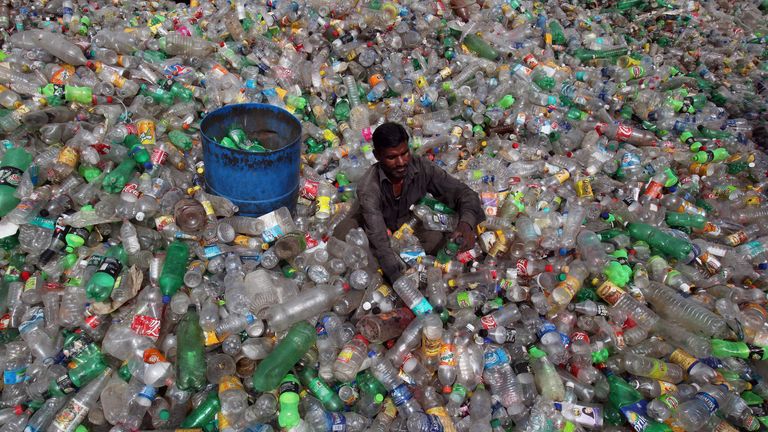Plastic planet: More than 8 billion tons produced since 1950s, scientists say
Putting it into context, the amount of plastic created in 65 years is as heavy as 60 million blue wales or 138 million army tanks.
Wednesday 20 September 2017 15:04, UK
Scientists have calculated 8.3 billion tons of plastic has been created across the world since mass-production started in 1950.
The large majority of this, 6.3 billion, is now littering our countryside and oceans or buried in landfill, the US researchers found.
Of the total amount of produced from 1950 to 2015, roughly half was manufactured in just the last 13 years.
The scientists say that if current trends continue, roughly 12 billion tons of plastic waste will end up in the environment or landfills by 2050.
Co-author Dr Jenna Jambeck, from the University of Georgia, said: "Most plastics don't biodegrade in any meaningful sense, so the plastic waste humans have generated could be with us for hundreds or even thousands of years.
"Our estimates underscore the need to think critically about the materials we use and our waste management practices."
Less than 10% of plastic waste is recycled.
With the production of mass-produced plastics on the rise, researchers hope their findings will now help inform discussions on sustainability.
The scientists compiled production statistics for resins, fibres and additives from a range of industry sources, drawing a distinction between plastics and materials used extensively in construction, such as steel and cement.
The study's lead author, Roland Geyer, said: "Roughly half of all the steel we make goes into construction, so it will have decades of use.
"Plastic is the opposite - half of all plastics become waste after four or fewer years of use."
A global shift from reusable to single-use containers has created a large part of the plastic waste problem.
Past research has shown that the
While around 12% of our plastic waste is incinerated, this contributes to climate change and also has a negative effect on human health.
Unlike other materials, plastic can stay in the environment for thousands of years.
Sky News launched its Sky Ocean Rescue campaign earlier this year aimed at reducing the amount of plastic waste that ends up in the world's seas.
:: You can find out more about the Sky Ocean Rescue campaign and how to get involved at






